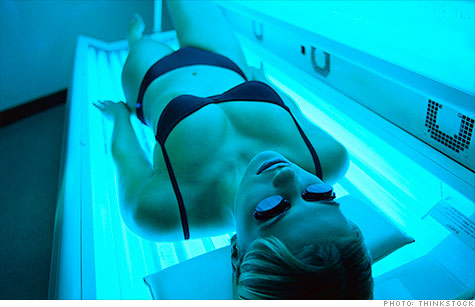
The Affordable Care Act slapped a 10% tax on indoor tanning.
NEW YORK (CNNMoney) -- The Supreme Court's decision Thursday on the health care reform law will address a burning question for MTV's Jersey Shore cast: What happens to Obamacare's so-called "tanning tax"?
For almost two years now, indoor tanners have paid an extra 10% tax on their bronzing bill.
The measure, a small provision buried in the Affordable Care Act, had two goals: to make a dent in the reform bill's $940 billion price tag and to discourage indoor tanning for health reasons. The risk of melanoma -- one of the deadliest forms of skin cancer -- increases by 75% when people begin tanning before the age of 35, according to the International Agency for Research on Cancer.
The tax hasn't seemed to do much on either front, though.
When the tax was implemented in 2010, the Congressional Joint Committee on Taxation projected that it would raise $200 million in 2011 fiscal year and around $2.7 billion by 2019. However, the IRS only collected $36.6 million in the first half of the 2011 fiscal year, according to the Treasury's inspector general for tax administration.
The tax also hasn't cut down on the demand for tanning, according to one study.
A full 78% of the salon owners polled reported that their clients did not seem to care about the tax, according to a study conducted by Northwestern University's Feinberg School of Medicine.
That "may indicate that the demand for indoor tanning services is somewhat inelastic and perhaps insensitive to a 10% tax level," according to a paper that the study's researchers published in the Archives of Dermatology.
But the tanning industry's lobby would still love to see the tax wiped out -- which may happen if the Supreme Court strikes down the entire Affordable Care Act.
"This has been trouble for business," said John Overstreet, executive director of the Indoor Tanning Association.
The industry's clients tend to skew younger and typically tend to have limited disposable income, so a 10% tax can be a real hit for them and the small businesses they support, he said. It also irked Snooki, who spoke against the tax on Jersey Shore.
The tanning tax was a late addition to the health care reform bill. It replaced the "Botax," a proposed 5% tax on cosmetic surgery.
No comments:
Post a Comment